Where is Jesus in Psalm 2?
Audio Player
Please have a seat. And let me say, ‘Happy New Year’, since I wasn’t here last Sunday. And to kick off, let me ask: what picture in your mind do you have of Jesus? How do you mainly think of him? Predictably, if you put Jesus into Google images, the main result is countless pictures of a man with white skin and blond hair (plus or minus dinner plate behind the head) – which is how he certainly didn’t look. So setting that aside, maybe after Christmas you’ve got the baby in the manger in your mind. Or maybe from a Catholic background you have a crucifix in mind – Jesus on the cross. Or maybe from last Sunday’s Psalm you’ve got the Lord is my shepherd in mind. Or my friend, or my Saviour. And apart from the white skinned, blond haired Jesus all those images of him are there in the Bible. And we need all of the Bible’s images of Jesus to know him as he really is, and especially, the Old Testament images of him. Which may sound strange because the Old Testament was written before Jesus. So for your picture of him, surely you go to the New Testament – which was written after Jesus and about Jesus.
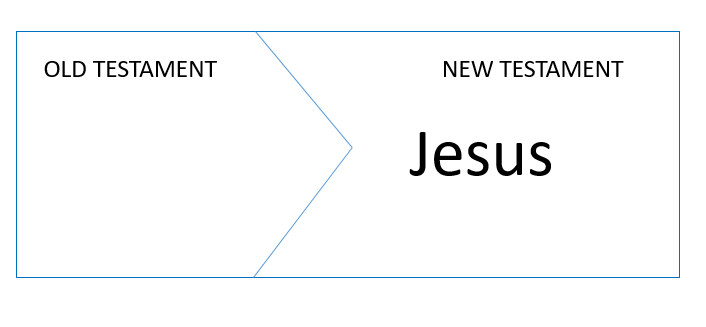
But the answer is you go to both because the Old Testament was also written about Jesus. It’s full of promises about him, and foreshadowings of him, and the New Testament simply tells the fulfilment of those.
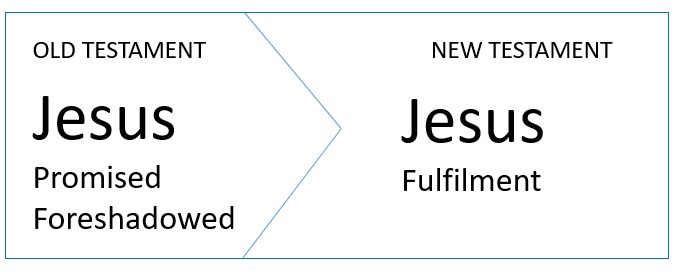
Now that may be old hat. You may be used to the idea that the Old Testament prophets pointed forward to Jesus – for example, that Micah 5.2 predicted his birth in Bethlehem. But you may not be so used to the idea that the Psalms also pointed forward to Jesus. Which is why we’re starting a series called Christ in the Psalms. And we’re going to look at the top four Psalms that the New Testament quotes to help us get our picture of Jesus right. So before we go on, let’s pray:
Father, Christmas has reminded us that you revealed yourself supremely in Jesus. But you began to reveal what he would be and do long before he came. So as we look at Christ in the Psalms, please open our eyes to see him more clearly. In his name, Amen
So would you turn in the Bibles to page 448 and Psalm 2 – and it’ll really help to have that open, as well as seeing verses up on screen. Page 448, and let’s ask; Where is Jesus in Psalm 2? So look down to Psalm 2.1-3:
Why do the nations rage and the peoples plot in vain? The kings of the earth set themselves, and the rulers take counsel together, against the Lord and against his Anointed, saying, “Let us burst their bonds apart and cast away their cords from us.”
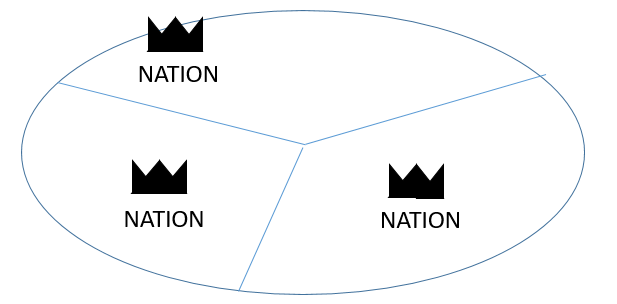
So here’s the picture: You’ve got the nations and their kings.
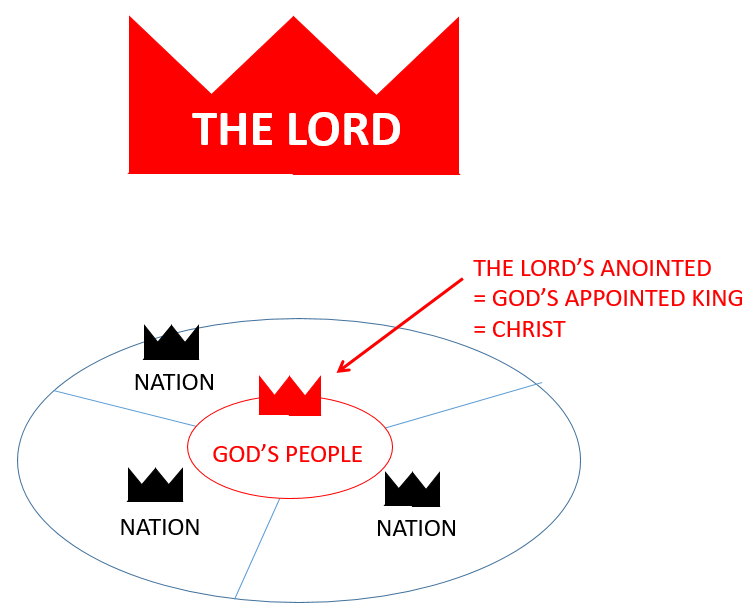
But then in the middle of them you’ve got the LORD’s people, ruled over by the LORD’s Anointed – in other words, a king appointed by God and marked out by an anointing ceremony. And the word Christ literally means ‘anointed’, so when you read Christ, just think, ‘God’s appointed king.’
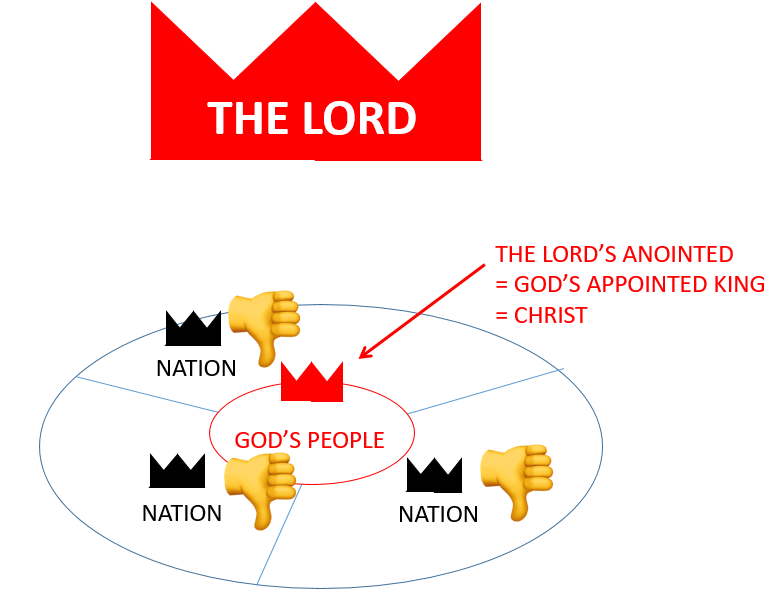
But the nations don’t like the idea of God re-establishing his rule over them. And so they’re against the Lord and against his Anointed, who get the thumbs down. OK. Keep Psalm 2 open in your Bible. And look at Acts 4 on the screens. So this is now in the New Testament; Jesus has died, risen from the dead and returned to heaven. The apostles have started spreading that message, and the rulers of the day don’t like it. So they arrest the apostles.
Acts 4.23-28:
When they were released, they went to their friends and reported what the chief priests and the elders had said to them. And when they heard it, they lifted their voices together to God and said, “Sovereign Lord, who made the heaven and the earth and the sea and everything in them, who through the mouth of our father David, your servant, said by the Holy Spirit, [And here comes Psalm 2.1-2] “‘Why did the Gentiles rage, and the peoples plot in vain? The kings of the earth set themselves, and the rulers were gathered together, against the Lord and against his Anointed’ – for truly in this city there were gathered together against your holy servant Jesus, whom you anointed, both Herod and Pontius Pilate, along with the Gentiles and the peoples of Israel, to do whatever your hand and your plan had predestined to take place.
So do you see what those first believers were doing. Look at Psalm 2 up on screen. They were saying the LORD’s Anointed was Jesus. And that the kings and rulers against him were Herod and Pontius Pilate, and that the people against him were the Gentiles and Jews of their day. And that the way they tried to burst the bonds of serving God was by crucifying Jesus. So Acts 4 is saying: the first bit of Psalm 2 (Psalm 2.1-3) is about Jesus’ death on the cross. OK. Now look at Acts 13 on screen. This is the apostle Paul speaking about Jesus – whom he says was crucified and put in a tomb.
Acts 13.30-33:
“But God raised him from the dead, and for many days he appeared to those who had come up with him from Galilee to Jerusalem, who are now his witnesses to the people. And we bring you the good news that what God promised to the fathers, this he has fulfilled to us their children by raising Jesus, as also it is written in the second Psalm, [And here comes Psalm 2.7…] “‘You are my Son, today I have begotten you.’”
So Acts 13 is saying: the next bit of Psalm 2 (Psalm 2.4-7) is about Jesus’ resurrection. Which might sound like pulling a gospel rabbit out of the Psalm 2 hat. So here’s the question: how could the New Testament writers say that Psalm 2 was about Jesus? Because some Bible scholars would say, ‘It wasn’t, and they were twisting it.’
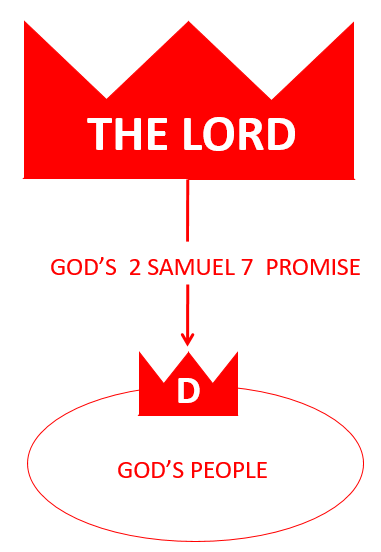
Well, here’s the picture of God’s Old Testament people again but with a ‘D’ in the crown of the LORD’s Anointed to show it’s in King David’s time. And next to it is the promise God made to David in 2 Samuel 7.12-16. God said to King David:
“When your days are fulfilled and you lie down with your fathers, I will raise up your offspring after you, who shall come from your body, and I will establish his kingdom. He shall build a house for my name [which is talking about Solomon building the temple], and I will establish the throne of his kingdom for ever. I will be to him a father, and he shall be to me a son. When he commits iniquity, I will discipline him with the rod of men, with the stripes of the sons of men, but my steadfast love will not depart from him, as I took it from Saul, whom I put away from before you. And your house [in other words, ruling family, as in ‘House of Windsor’] and your kingdom shall be made sure for ever before me. Your throne shall be established for ever.’”
So that’s a promise to David and his family line that theirs will be a forever kingdom. And it’s a promise that they will rule under God and for God. That’s why God says I will be to him a father, and he shall be to me a son. Because in those days, a son normally shared his father’s occupation. So if his father was a farmer, he became a farmer; if his father was a king, he became a royal; and so on – like father, like son. So God is saying to David and his successors: ‘It’s going to be ‘like father, like son’ between me and you. You’re going to share my rule – by ruling under me and for me.’ Now that 2 Samuel 7 promise of a forever kingdom could be fulfilled in one of two ways.

Way no.1 is a forever line of kings – each replacing the last who’s died.

Whereas way no.2 is that, one day, you have a forever king – who lives forever. So with 2 Samuel 7 in mind, look back to Psalm 2, and remember: Acts 4 told us it was written by David. So originally, this is David, under pressure from neighbouring nations, reassuring himself by looking back to God’s 2 Samuel 7 promise. So he says (Psalm 2.1-3):
Why do the nations rage and the peoples plot in vain? [In other words, ‘I shouldn’t feel threatened by them.’] The kings of the earth set themselves, and the rulers take counsel together, against the Lord and against his Anointed, saying, “Let us burst their bonds apart and cast away their cords from us.”
But David then lifts his eyes from the human opposition to God, Psalm 2.4-7:
He who sits in the heavens laughs; the Lord holds them in derision. [Not that rebellion against God is a laughing matter – it’s just a way of saying: God is completely unthreatened by it.] Then he will speak to them in his wrath, and terrify them in his fury, saying, “As for me, I have set my King on Zion, my holy hill.” [In other words God says, ‘I’ve made David king, I’ve made my 2 Samuel 7 promise, and no opposition can change that. And then David speaks, reminding himself of the 2 Samuel 7 promise:] I will tell of the decree: The Lord said to me, “You are my Son; today I have begotten you.”
Which means, remember: that from the day David took the throne, ‘like father, like son’, he shared God’s rule. Now that still hasn’t answered the question, ‘How is Psalm 2 about Jesus?’ But we’re on the way. Because what happened after David was this.

God kept his promise that there would be a David line of kings, but instead of leading God’s people to trust and obey God, they ultimately misled them to distrust and disobey God. And so God ultimately brought the judgement of the exile upon them – which seemed to bring the David line of kings to an end. So it looked like the 2 Samuel 7 promise had failed, when in fact it had just gone underground, a bit like the metro does here at Jesmond – so that you can’t see it from above ground for a while, but the train’s still running.
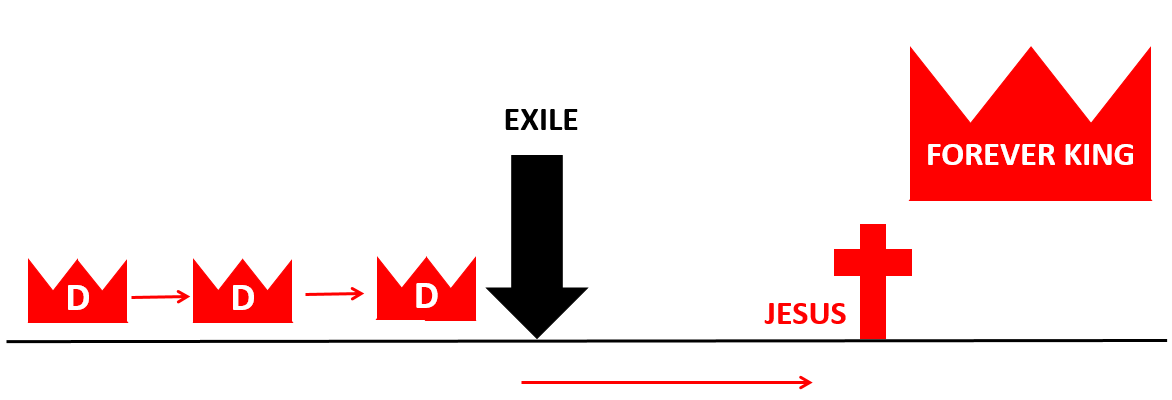
And beyond the exile, the 2 Samuel 7 promise was still running, even when Israel no longer had visible, human kings. And it was heading for that second way of bringing about a forever kingdom, which is that one day, you have a forever king – who lives forever, having died on a cross, and risen from the dead, and returned to heaven to share his Father’s rule. And so you can read Psalm 2 as originally about David, the first in that line of kings.
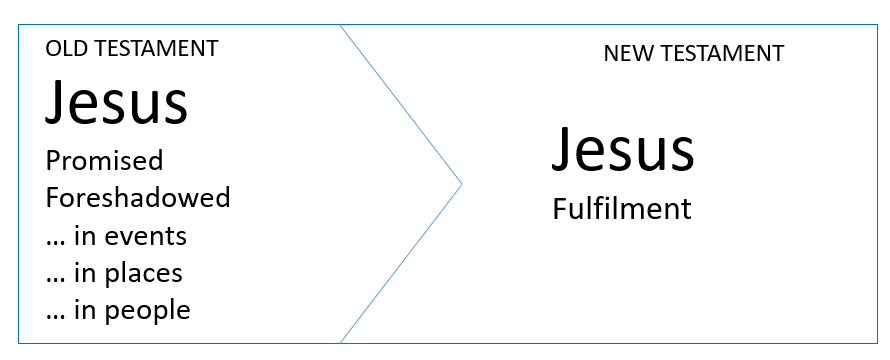
But the whole point of David and his kingdom was to foreshadow Jesus and his kingdom because the Old Testament didn’t only point forward to Jesus with predictions like Micah 5.2, it foreshadowed Jesus in events like the Passover, in places like the temple, and in people like the David line of kings. And so you can also, ultimately, read Psalm 2 as foreshadowing Jesus, the one to whom that line of kings was heading. So let’s do that, to end with.
Psalm 2.1-3 again:
Why do the nations rage and the peoples plot in vain? The kings of the earth set themselves, and the rulers take counsel together, against the Lord and against his Anointed, saying, “Let us burst their bonds apart and cast away their cords from us.”
So that doesn’t just describe the opposition David faced. It foreshadows the opposition Jesus faced, when they tried to cast him away through the cross. But the world had to learn that you can reject God’s Christ, but you can’t get rid of him. (Psalm 2.4-6):
He who sits in the heavens laughs; the Lord holds them in derision. [Not that he laughed at what they did to his Son, but at the futility of thinking it would get rid of him] Then he will speak to them in his wrath, and terrify them in his fury, saying, “As for me, I have set my King on Zion, my holy hill.”
And that’s what God the Father did as he raised Jesus from the dead. It’s as if he was saying, ‘You may not want him as king, but the fact is I’ve raised him and set him on the throne of this universe as the ultimate fulfilment of my 2 Samuel 7 promise and no opposition can change that.’ So you can persecute Christians, you can say you’re an atheist, but it won’t change the fact that Jesus lived, died, rose again and is your rightful king. And then in Psalm 2.7, the risen Jesus speaks:
I will tell of the decree: The Lord said to me, “You are my Son; today I have begotten you.”
And remember: that’s ‘like father, like son’ language about what Jesus has been doing since the day of his resurrection – sharing his Father’s rule. It’s not language about who Jesus is. It’s not saying he’s only been the divine Son of God since his resurrection. He’s been that eternally. So Psalm 2 foreshadows: Jesus’ death, Jesus’ resurrection, Jesus’ enthronement in heaven, and next it foreshadows, the spread of his kingdom. Look on to Psalm 2.8:
Ask of me [says God the Father to the Son], and I will make the nations your heritage, and the ends of the earth your possession.
And that happens through the worldwide spread of the gospel. And as people hear it, and realise Jesus is their rightful king, and ask him to forgive them back into relationship with him, they do become his possession again. The alternative is to remain on collision course with him, in which case, Psalm 2.9:
You shall break them with a rod of iron and dash them in pieces like a potter's vessel.
And that foreshadows Jesus’ coming again to wrap up history, and to bring all rebellion against God to account. Which just leaves the application of all this, in Psalm 2.10-12. (Psalm 2.10):
Now therefore, O kings, be wise; be warned, O rulers of the earth.
So your majesty, and Prime Minister, if you’re watching online, this is especially for you because those of us in power, with any sort of position great or small, easily think we’re above accountability – when no-one is above accountability to Jesus. And actually the problem we all have is behaving like we were our own little king, ruling our lives as if God wasn’t there. Which means Psalm 2.10-12 are to all of us, not just Charles and Rishi. So what do we each need to do, to respond to Jesus rightly? Well, Psalm 2.11-12:
Serve the Lord with fear, and rejoice with trembling. Kiss the Son [that is, kiss his feet – which was a sign back then of submitting to a king’s rule], lest he be angry, and you perish in the way, for his wrath is quickly kindled...
In other words, we each need to come to Jesus and say, ‘I will serve you as my King from now on.’ And if you ask, ‘But what will he do about all the ways we’ve failed to do that?’ The answer’s in the very last line (of Psalm 2.12):
…Blessed are all who take refuge in him.
In other words, he’ll meet us with the blessing of forgiveness of all we’ve done wrong because he paid for that on the cross, as we’ll remember in communion.
Well I began by asking: what picture in your mind do you have of Jesus? And I don’t know what your answer was, but this morning has shown us that we need to picture him as the King of Psalm 2. The rightful King of every person on the planet. The King we’ll ultimately give account to. And the King who died and rose again so we could be forgiven back on the right side of him before that happens. And if you haven’t seen Jesus this way before, it shows how much we need to see Christ in the Psalms, as well as everywhere else in the Bible. Let’s pray.
